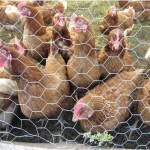Concerned About Supply Management In Ontario
Posted: January 24, 2012
Categories: Food in the News / News from Sustain Members / Ontario Food Policy

Although, most farmers raising chickens or eggs in Ontario must hold quota, both the Chicken Farmers of Ontario and the Egg Farmers of Ontario have quota exemptions for farmers raising small flocks of either meat birds or hens. Small farmers in Ontario are able to raise up to 100 hens without holding quota and up to 300 meat chickens without holding quota, therefore, the story of inspectors putting a stop to a farmer raising 100 chickens does not ring true. In addition, Mr. Schatzker suggests that the minimum purchase of chicken quota in Ontario is the equivalent of 90,000 birds a year. Again, this is not accurate information. Across Ontario, there are many small quota holders, raising a few thousand birds a year and selling them direct from their farms, to upscale resturants and/or to small retail outlets. Many of the chickens raised by these small quota holders are pasture-raised, organic and/or heritage breeds.
As to unique dairy operations – several on-farm dairies have opened in recent months, as part of an initiative by the Dairy Farmers of Ontario and Ontario Ministry of Agriculture to help interested dairy farmers become part of the local food scene. Some of these dairy farms are processing and selling their own fluid milk, others are making cheese. Once again, among these dairy farms are organic, breed specific and grass-fed (at least when the grass is growing in Ontario) cows. Ontario butter made from pasture-fed cows, can be found in the organic dairy aisle of Ontario health food stores and supermarkets. Organic dairy farmers in Ontario have successfully found their niche within supply management, and with the organic requirement for cows to be on pasture, whenever pasture is available, organic butter is full of the colour and flavour of green pastures.
Finally, I find it interesting that at the end of his article, Mr. Schatzker suggests Hon. Stephen Harper is a champion of slow food. From my research into the Slow Food movement, the movement is built around the ideals of Good, Clean, Fair food and that ‘fair’ refers, in part, to providing just wages to those of us who grow food. In the 1960’s, farmers came together to push for supply management in dairy, chicken and eggs because they were not receiving a fair price from processors for their milk, eggs or chickens. Through the collective marketing provided by supply management, farmers are able work together to negotiate a fair price for their produce.
According to the Canadian Dairy Information Centre, over 75% of the milk in Canada is processed by one of three processors – Saputo, Agropur or Parmalat. This is produced by over 16,000 dairy farms across the country. Through their collective power, dairy farmers are able to push the small number of processors to pay a fair price for the milk they produce, a price that covers their cost of production. Yes, there are changes that need to be made within supply management but supply management does provide a fair and stable income for dairy, chicken and egg farmers. The price of quota is an issue that needs to be dealt with by farmers, and in Ontario there is a cap on the price of milk quota. However, instead of just looking at the implications of quota costs on small farmers, society should also look at the escalating prices of farm land, especially farmland around urban areas being bought for industrial and residential development . Developers and speculators who drive up the price of land also make it more difficult for small farmers to raise livestock or grow crops.
by Ann Slater, National Farmers Union Ontario Coordinator, aslater@quadro.net 519-349-2448
2 responses to “Concerned About Supply Management In Ontario”
Leave a Reply
You must be logged in to post a comment.

Interesting rebuttal. There are some excellent points in this post. However, I still question whether supply management stifles competition enough to prevent the level of innovation evident in the US poultry industry. Your thoughts?